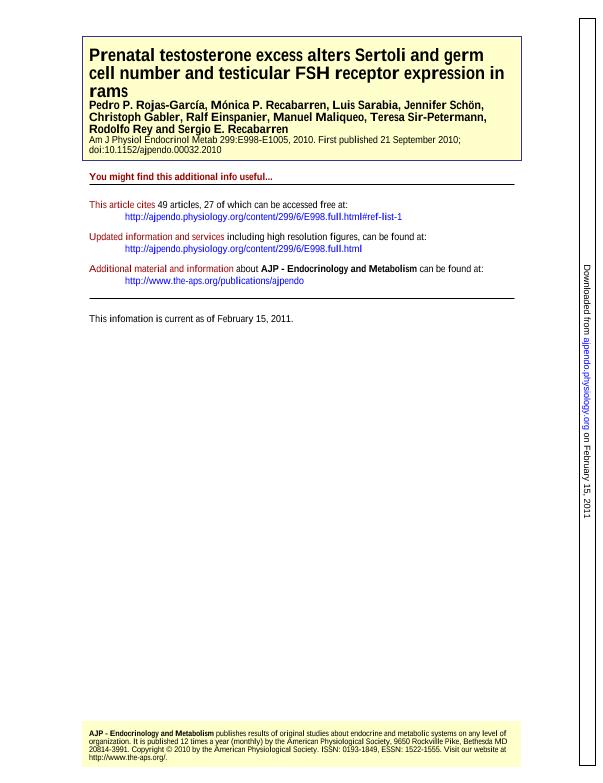Artículo
Prenatal testosterone excess alters Sertoli and germ cell number and testicular FSH receptor expression in rams
Rojas García, Pedro P.; Recabarren, Mónica; Sarabia, Luis; Schön, Jennifer; Gabler, Christoph; Einspanier, Ralf; Maliqueo, Manuel; Sir Petermann, Teresa; Rey, Rodolfo Alberto ; Recabarren, Sergio E.
; Recabarren, Sergio E.
 ; Recabarren, Sergio E.
; Recabarren, Sergio E.
Fecha de publicación:
12/2010
Editorial:
American Physiological Society
Revista:
American Journal Of Physiology-endocrinology And Metabolism
ISSN:
0193-1849
Idioma:
Inglés
Tipo de recurso:
Artículo publicado
Clasificación temática:
Resumen
Exposure to excess testosterone (T) during fetal life has a profound impact on the metabolic and reproductive functions in the female's postnatal life. However, less is known about the effects of excess testosterone in males. The aim of the present study was to evaluate the impact (consequences) of an excess of T during fetal development on mature male testis. The testicular evaluation was by histological analysis and by determination of mRNA expression of the FSH receptor (FSH-R), transforming growth factor-β type I receptor (TβR-I), and two members of the TGF-β superfamily, transforming growth factor-β3 (TGFβ3) and anti-Müllerian hormone (AMH) in males born to mothers receiving an excess of T during pregnancy. At 42 wk of age, postpubertal males born to mothers treated with 30 mg of T propionate twice weekly from day 30 to 90, followed by 40 mg of T propionate from day 90 to 120 of pregnancy (T males), showed higher concentrations of FSH in response to a GnRH analog, a higher number of Sertoli cells/seminiferous tubule cross-section, and a lower number of germ cells/tubules (P < 0.05) than control males (C males) born to mothers treated with the vehicle. The mRNA expression of FSH-R and of TβR-I was higher in T males compared with C males (P < 0.05). Moreover, in T males, AMH expression level correlated negatively with the expression level of TGFβ3. In C males, this latter correlation was not observed. These results suggest that prenatal exposure to an excess of T can negatively modify some histological and molecular characteristics of the mature testis.
Palabras clave:
FETAL PROGRAMMING
,
FOLLICLE-STIMULATING HORMONE
Archivos asociados
Licencia
Identificadores
Colecciones
Articulos(CEDIE)
Articulos de CENTRO DE INVESTIGACIONES ENDOCRINOLOGICAS "DR. CESAR BERGADA"
Articulos de CENTRO DE INVESTIGACIONES ENDOCRINOLOGICAS "DR. CESAR BERGADA"
Citación
Rojas García, Pedro P.; Recabarren, Mónica; Sarabia, Luis; Schön, Jennifer; Gabler, Christoph; et al.; Prenatal testosterone excess alters Sertoli and germ cell number and testicular FSH receptor expression in rams; American Physiological Society; American Journal Of Physiology-endocrinology And Metabolism; 299; 6; 12-2010; 1-9
Compartir
Altmétricas



